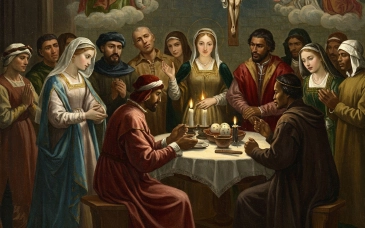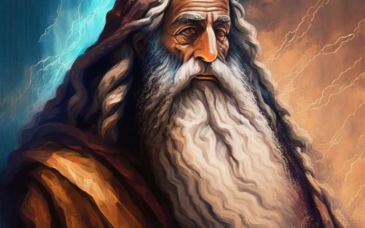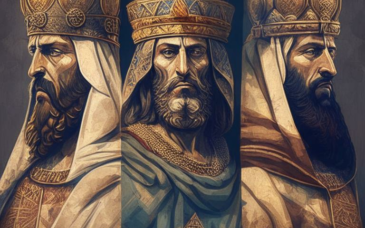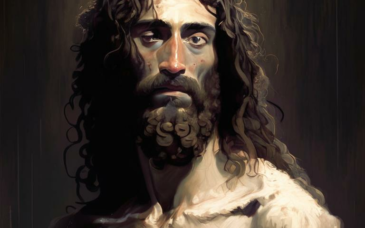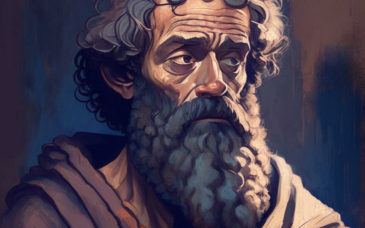The term Disciple is a general one which stresses the teacher student relationship. A Disciple was one who followed a teacher and learned from what they said. John the Baptist had disciples Matthew 9:14 as did Paul. Acts 9:25 It is more popularly used to describe those who followed Jesus, both the inner and outer circle of followers. It is used of the Twelve who followed Jesus as well as all those who believed on him. Matthew 10:1; John 8:30,31 The requirements for being a disciple are leaving one's occupation, Mark 1:18,19 and family Mark 10:28 and take up the cross and follow Christ even to the point of death. Matthew 10:38 The term is only used in the Gospels and Acts and two references in Revelation. Revelation 14:4; 19:14
Apostles
This is a transliteration of the Greek word apostolos. It means 'One who is sent'. In secular Greek it refers to a naval expedition. The idea was that an apostle was one who was sent as a special representative of Christ. Mark 3:14ff Generally the term refers to the twelve Apostles plus Paul although there were other Apostles mentioned in the New Testament. James and Barnabas are called Apostles as well as Andronicus and Junia in Romans 16:7. Epaphroditus and Silvanus are also mentioned. Philippians 2:25; 1 Thessalonians 2:6
Qualifications
What were the qualifications for Apostles. They had a direct call from the Lord. Men became Apostles by divine appointment. They were not from man. Galatians 1:1; Mark 3:13-14 They came to Christ, entered into fellowship with Him and then were sent back into the world. Acts 1:21-22
One of the essential marks of an Apostle was an eye witness of the resurrection of the Lord Jesus Christ. The resurrection of Christ was crucial to the claims of the Apostles own resurrection, also they would not have a living Saviour if He didn't raise from the dead and could not come back. The Apostles could not speak without the sign of God's acceptance of Christ's sacrifice.
Apostles and the Church
The Early Church was built upon the foundation of the Apostles and Prophets. Ephesians 2:20-22 The basis of their fellowship was the Apostles teaching and doctrine. Acts 2:42 The Church may truly be described as Apostolic Jesus Himself being the cornerstone. Christ is the unifying basis between the prophets and the apostles. Prophets prophesied of Christ and the Apostles explain the implications of the death of Christ and looked to His coming again.
Christ is the Chief cornerstone. The Church which was founded through the Apostles is still guided by the Apostles through their writings which are incorporated in the New Testament. The true apostolicity of the Church depends, therefore, upon acceptance of the truths preached by the apostles, and living the kind of life which they enjoined and exemplified.
When the Church departs for the Apostles teaching it moves from Apostolicity to Apostasy.
Simon Peter

So much is known about Peter from the New Testament that all cannot be described in detail. More is know about him than any other apostle. A native of Bethsaida in Galilee he was a fisherman. He probably was in business with his brother Andrew and James and John, sons of Zebedee. He was also married. Mark 1:30 He was a disciple of John the Baptist, when he was introduced to the Lamb of God by his brother Andrew. When Jesus saw Peter he said 'You are Simon son of John. You will be called Cephas'. John 1:42
In every listing of the Apostles Peter is listed first. He was the spokesman for the Apostles more out of his outspokenness than appointment. He is best described by the word impetuous.
For Further Study See Life of Peter
James, Son of Zebedee
James was the Son of Zebedee and the brother of John. Mark 3:17; Acts 1:13 Nothing is mentioned in Scripture about his place of birth or his background. It is known that he was a fisherman when he was called to follow Christ. He was mending the fishing nets with his father and brother when Jesus called him to follow Him. He immediately left his occupation and followed Jesus. Matthew 4:21,22; Mark 1:9 James is listed fourth in the inner circle of the Apostles.
James' influence in the early Church can be seen in the reaction of Herod in Acts 12:1-2. In the persecution of the early Church James was among the first to be singled out and put to death by the sword. This was no doubt because of his prominent place in the life and ministry of the early Church. The martyrdom of James pleased the Jew and Herod proceeded to arrest Peter as well. James is the only apostle whose death as a martyr is recorded in the New Testament. His death is calculated at about ten years after the crucifixion of Christ.
John, Brother of James
John was the son of Zebedee 'Son of Thunder' and the brother of James. He is the second in place of prominence among the Apostles. He was married and his wife ministered with to Jesus and the disciples with her wealth. Matthew 27:55-56 His mothers name was Salome. Mark 15:40-41 While more is mentioned in the New Testament about Peter, more is written about John in the area of New Testament studies. He is responsible for writing the Gospel of John, three letters by his name and recording the visions in Revelation.
He was first a disciple of John the Baptist and then pointed to the Lamb of God he began following the promised Messiah. John 1:19-42 John went back fishing with his brother James for a short period until Jesus came by and called John to follow Him. Matthew 4:21 He was a personal witness of many of the miracles and healing that Jesus performed. He witnessed the raising of Jairus' daughter from the dead. Mark 5:37 He was one of three with Jesus on the mount of Transfiguration. Matthew 17:1 It was the two sons of thunders who wanted to know who would be the greatest in the kingdom of heaven. Matthew 20:20 John along with Peter was given the privilege of making preparations for the Passover, and later at the Last Supper it was John who first learned of Judas' betrayal. John is called the beloved disciple and is the only disciple who personally witness the crucifixion. Jesus requested that John take His mother into his own house and care for her. John 19:25-27
Two incidents reveal that John was a sinner in need of forgiveness and salvation. On one occasion James and John wanted to call down divine judgment on a Samaritan village that refused them hospitality. Luke 9:54 Also John's question about who would be first in God's kingdom seem to indicate a sense of pride and special favor. Matthew 20:20 Neither of these were granted to John by Jesus but rather a rebuke and correction was given instead.

John is often found together with Peter in the book of Acts. He accompanies him on the mission to Samaria. Acts 8:14ff John became an important member of the Church at Jerusalem. Irenaeus one of the early Church Fathers states that he later became the bishop of Ephesus. There have been found archaeological evidence of Churches with his name on them in Ephesus. Under the persecution of Emperor Domitian, John was exiled to the island of Patmos where he was given the encouraging message of the victory of the Church in Revelation. John is the only Apostle that has no record of martyrdom and it is believed that he died a natural death perhaps on the Island of Patmos in the Aegean. Revelation 1:9

Andrew
Andrew was the first of the Apostles to follow Jesus. He was the son of Jona or John and lived in Bethsaida . John 1:42-44, 21:15-17 He was a Palestinian Jew with a Greek name. The only other Apostle with a Greek name was Philip. Andrew was the brother of Simon Peter and they were fishermen together when they were called to follow Christ. Matthew 4:18; Mark 1:16 Andrew was a disciple first of John the Baptist and upon hearing the announcement of Jesus being the Lamb of God he followed Jesus and brought his brother Peter to follow Jesus. After John's imprisonment Mark 1:14 Jesus called Andrew and Peter to give up fishing and follow Him making them Fishers of Men. Matthew 4:18-19
Andrew and Peter lived together in the same house in Capernaum. Andrew was not married but stayed with his married brother. It was here that Peter's mother-in-law was healed. Mark 1:29-30 It was Andrew who brought the young boy with the loaves and fishes at the feeding of the five thousand. John 6:8-9
False writings called the 'Acts of Andrew' and the 'Acts of Andrew and Matthias' have been attributed to him but they were made up to oppose the New Testament writings. Traditions claims that Andrew was martyred on an X cross at Patras in Achaia. This has led to this type of cross being called St. Andrew's Cross. St. Andrew is the patron saint of Scotland, Russia and Greece as he is said by tradition to have ministered in some way in these places.
Philip
There are four different men by this name in the New Testament. There was Philip Herod I and II and also Philip the evangelist and deacon. Acts 6:5 Philip the apostle is listed among the original Apostles in Matthew 10:3; Mark 3:18; Luke 6:14 His home was in Bethsaida where Andrew and Peter lived. John 1:44; 12:21 Philip is only mentioned in the list of the Apostles in Matthew, Mark and Luke. It is John that speaks of his place among the Apostles.
He was fourth to be called as an apostle. John 1:43 He was used of God to bring Nathanael to meet Christ. John 1:45-49
Bartholomew
Bartholomew only occurs in the New Testament in the list of the Apostles. Matthew 10:3; Mark 3:18; Luke 6:14 ; Acts 1:13 His name means 'son of Talmai'. A strong case is made for identifying him with Nathanael. They are never mentioned together in the New Testament. The Gospel of John never mentions him but mentions Nathanael and the synoptic Gospels never mentions Nathanael but mentions Bartholomew. Church tradition has Bartholomew involved in Missionary activities as far away as India and Armenia. He is said to have been martyred.
Matthew
Matthew means 'gift of Yahweh'. He was a tax collector who lived in Capernaum. His father was Alphaeus and he is also identified as Levi. Mark 2:14; Luke 5:27 It was not uncommon in Bible times to have two names. Matthew's father is not the same as another Alphaeus who was the father of James. Matthew 10:3; Acts 1:13 He is called by Jesus to become a disciple in Matthew 9:9; Mark 2:14; Luke 5:27-28.
While many of the Apostles were fishermen Levi was a tax collector. To be a tax collector in this period was one of the most despised jobs one could have. For Jews it was a great sin to pay taxes or tribute to any other than God. Tax collectors were also hated because of their reputation of being unfair and dishonest. They were placed among criminals in their estimation by Jews. That Matthew was a Jew working for the Roman government made his position worse than a criminal, it was equal to denying God. Jesus called him from his life of social injustice to a life of Gospel missions. His being called as an apostle displayed the grace and forgiveness of God in the hearts and lives of sinners. Matthew 9:12-13; 21:28-32
He wrote the first Gospel record of the life of Christ. To one so despised by the world has come a book that is most loved. His purpose in writing was to show his fellow Jew that Jesus of Nazareth was indeed the Messiah the king of the Jews. Matthew shows how the grace of God extends to all sinners alike, both to Jews and Gentiles. While Church tradition has him dying as a martyr in Ethiopia, it is unlikely he died as a martyr and more likely that it was natural causes.
Thomas
When Thomas is mentioned in the Gospel of John he is referred to as 'Didymus'. In Greek this means 'twin'. John 11:16 He has been called Judas Thomas meaning 'Judas the twin' in the Syrian speaking churches. All that Matthew Mark and Luke record of him is his name.
It is in John's Gospel that his life and character come out. There are three incidents recorded by John which shed light on Thomas. When Jesus told his disciples of his intentions in going into Judea to raise Lazarus from the dead, all of the disciples protested because of the danger. It was Thomas who said 'Let us also go, that we may die with Him.' John 11:1-16 No doubt Thomas did not realise the prophecy he had uttered in speaking of Jesus' death.
In the Upper room it was Thomas who wanted to know how to go where Jesus was going. He openly confessed his ignorance and dullness of mind in what Jesus was speaking about and it gave rise to an opportunity for Jesus to give further clarification to the disciples. John 14:1-7
Finally following the resurrection, Thomas was not with the rest of the disciples and when told of the appearance of Jesus, Thomas refused to believe unless he could place his fingers in the nail marks of Jesus' body. John 20:24-25 For his act of unbelief, Thomas has become famous as 'Doubting Thomas'. Upon Jesus returning and appearing to Thomas, He is given the invitation to put his finger in his side but it was not necessary and with Thomas' great belief came an even greater confession. 'My Lord and My God!' John 20:28 He is also mentioned in John 21:1-14 and Acts 1:12-14.
Origin, one of the early Church Fathers recounts how Thomas carried on Missionary work in Pathia. Many false stories have arisen about Thomas and his missionary activities. One suggests that he was a missionary in India and built a palace for one of their princes. He is suppose to have died as a martyr, but Clement of Alexandria states that he died a natural death.
James, Son of Alphaeus
James is listed ninth in the list of Apostles. Matthew 10:3; Mark 3:18; Luke 6:15; Acts 1:13 This is the only reference to James. His father was Alphaeus. Some scholars try and identify him as the same James as James the younger or little. Mark 15:40 The argument is that Alphaeus his father is the same as Cleopas or Clopas whose wife was Mary. John 19:25 This Mary is said to be the same Mary of James the Lesser. Matthew 27:56; Mark 15:40 Church tradition has James coming from the tribe of Gad and being stoned by Jews for preaching and buried in Jerusalem.
Judas, Son of James
Matthew records the list of Apostles with the name Thaddaeus, Matthew 10:3 while Luke and Acts lists Judas (Jude) the son of James. Luke 6:14-16; Acts 1:13 Matthew may have used the name Thaddaeus which means 'breast' and Lebbaeus which means 'heart' to distinguish him from Judas Iscariot. Jerome, one of the church fathers called him 'Trinomious' which means a man with three names. This is likely the Judas that John refers to as 'not Iscariot' in John 14:22. Here in John 14 Judas wanted to know why Jesus revealed himself to the disciples and not to the world. Judas looked for a demonstration of the power of the Ruling king.

Church tradition holds that he preached in the Mesopotamian region and was killed by an arrow near Mt. Ararat.
Simon the Zealot
Simon is called by the name Canaanite not because he was a Canaanite by birth but by character. Matthew 10:4; Mark 3:18 He is said to be a Zealot in several passages. Luke 6:15; Acts 1:13 The Zealots were a militant nationalistic Jewish party, fanatical in their hatred of Roman dominance. It was out of this background that Jesus called this apostle. Church tradition records that he also died as a Martyr.
Judas Iscariot
Judas Iscariot was the one false Apostle. He was the son of Simon who lived in Kerioth in Judah. He may well have been the only Judean among the Apostles who were Galilean. He is set apart by all of the Gospel writers as the one who betrayed Jesus. Matthew 10:4; Mark 3:19; Luke 6:16 He was the treasurer of the group of Apostles.
When Jesus was about to be anointed by Mary with expensive perfume it was Judas who protested that the ointment should be sold and the money given to the poor. Given his character he was more interested in the money passing through his purse than in the poor. Matthew 26:6-13 During the night of Jesus betrayal Judas left the upper room to make final arrangements to hand Jesus over to the authorities. He would give a kiss and in exchange receive thirty pieces of silver.
Following Christ's arrest Judas was filled with remorse and gave back the money he had taken from the chief priests and elder. He confesses that he had betrayed innocent blood and went out and hanged himself. Matthew 27:3-5; Acts 1:18
He was a man who was filled with greed and John tells us that Satan had filled him so his actions were demonic. John 6:7; 13:2, 27 However while Judas was the instrument of the death of Christ, it was the sin of mankind which brought about the certainty of the Crucifixion.
The lesson this teaches is that false profession can be found in the closest circle around Jesus without it being detected by others. It reveals the strength of human depravity.
Matthias
Matthias means 'gift of Yahweh'. His place among the Apostles was in providing a replacement for Judas Iscariot who was a traitor. Acts 1:23-26 Two men were selected by a hundred and twenty disciples who met the qualifications of an Apostle. Following prayer the lot was cast to acquire the divine selection. Casting of lots was not practised or recorded in the New Testament following the coming of the Holy Spirit at Pentecost. With the guidance of the Holy Spirit and the written word during the New Testament era there was no need for casting lots.
Some commentators have speculated that Peter should have waited until after Pentecost before appointing a replacement because the position would have been filled by Saul. However the Scriptures give no indication that their actions were either in hast or in error. Traditions abound about his missionary activities in Ethiopia and that he was martyred in Judea.
Paul
Paul was also an Apostle. He was called by Christ, Galatians 1:1 witnessed the resurrection, and sent out to the Jews and the Gentiles. Eyewitnesses were the basis upon which the early church was built. But although Paul's authority and apostleship was recognised by the Church at Jerusalem, Paul never asserted membership among the Twelve but took a subservient position. 1 Corinthians 15:9-11 Paul did not glory in the office of Apostle but rather in the cross and grace of Christ.
For Further Study See The Life of Paul
